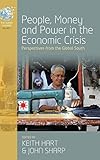People, Money and Power in the Economic Crisis : Perspectives from the Global South / ed. by Keith Hart, John Sharp.
Material type: TextSeries: The Human Economy ; 1Publisher: New York ; Oxford : Berghahn Books, [2014]Copyright date: ©2014Description: 1 online resource (246 p.)Content type:
TextSeries: The Human Economy ; 1Publisher: New York ; Oxford : Berghahn Books, [2014]Copyright date: ©2014Description: 1 online resource (246 p.)Content type: - 9781782384670
- 9781782384687
- online - DeGruyter
| Item type | Current library | Call number | URL | Status | Notes | Barcode | |
|---|---|---|---|---|---|---|---|
 eBook
eBook
|
Biblioteca "Angelicum" Pont. Univ. S.Tommaso d'Aquino Nuvola online | online - DeGruyter (Browse shelf(Opens below)) | Online access | Not for loan (Accesso limitato) | Accesso per gli utenti autorizzati / Access for authorized users | (dgr)9781782384687 |
Frontmatter -- Contents -- Preface: The Human Economy Project -- Introduction -- Chapter 1 After the Big Clean-Up: Street Vendors, the Informal Economy and Employment Policy in Zimbabwe -- Chapter 2 Immoral Accumulation and the Human Economy of Death in Venda -- Chapter 3 ‘Letting Money Work for Us’ Self-Organization and Financialization from Below in an All-Male Savings Club in Soweto -- Chapter 4 Market, Race and Nation History of the White Working Class in Pretoria -- Chapter 5 Negotiating Inequality The Contemporary Black Middle Classes in Salvador, Brazil -- Chapter 6 Live Music in the Age of Digital Reproduction: Cape Verde -- Chapter 7 Congo-Gauteng: Congolese Migrants in South Africa -- Chapter 8 Neither Nationals nor Cosmopolitans: The Political Economy of Belonging for Mozambican Indians -- Chapter 9 Marwari Traders between Hindu Neoliberalism and Democratic Socialism in Nepal -- References -- Contributors -- Index
restricted access online access with authorization star
http://purl.org/coar/access_right/c_16ec
The Cold War was fought between “state socialism” and “the free market.” That fluctuating relationship between public power and private money continues today, unfolding in new and unforeseen ways during the economic crisis. Nine case studies -- from Southern Africa, South Asia, Brazil, and Atlantic Africa – examine economic life from the perspective of ordinary people in places that are normally marginal to global discourse, covering a range of class positions from the bottom to the top of society. The authors of these case studies examine people’s concrete economic activities and aspirations. By looking at how people insert themselves into the actual, unequal economy, they seek to reflect human unity and diversity more fully than the narrow vision of conventional economics.
Mode of access: Internet via World Wide Web.
In English.
Description based on online resource; title from PDF title page (publisher's Web site, viewed 25. Jun 2024)


